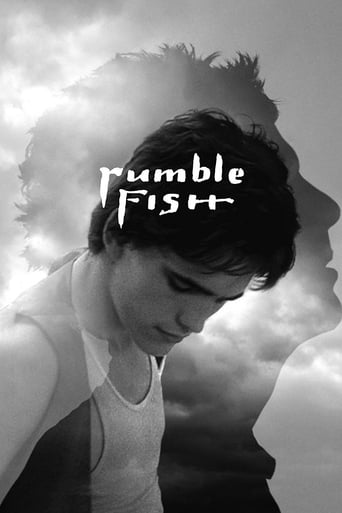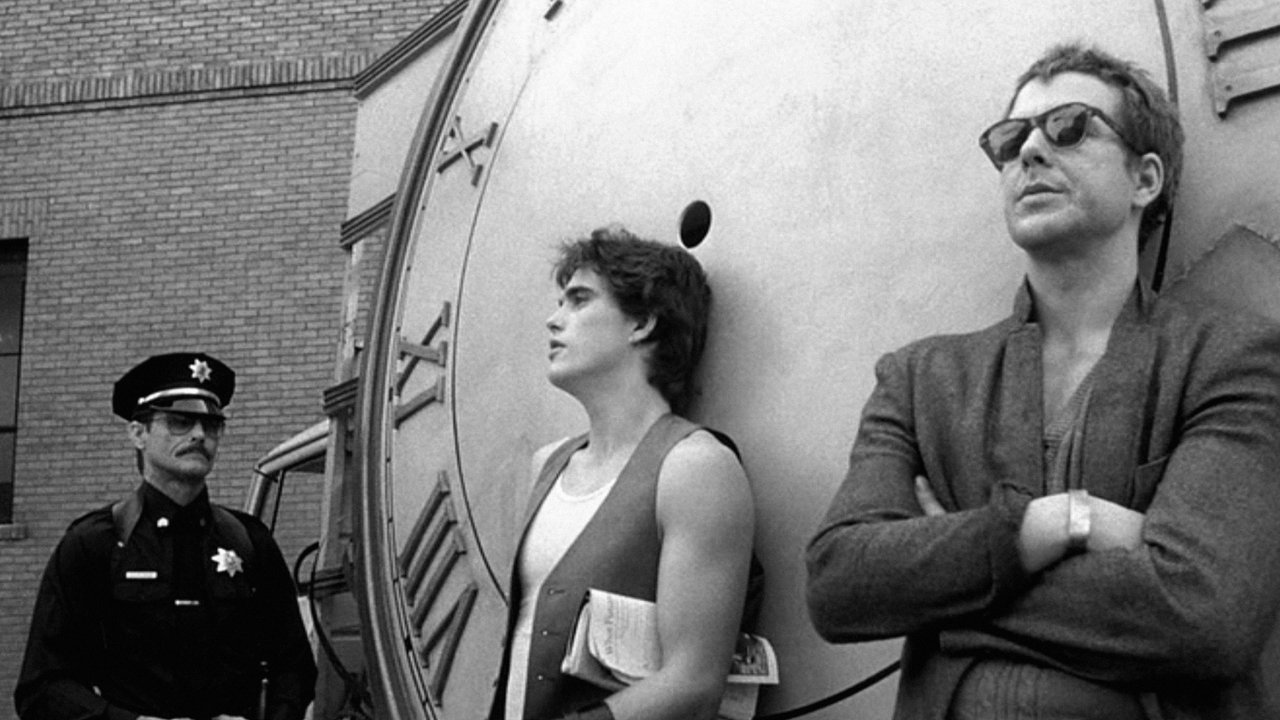oOoBarracuda
Rumble Fish is a little film talked about in Francis Ford Coppola's notable filmography, and one that everyone suffers from its lack of attention. Although a bold statement to make of the same director that The Godfather trilogy to life, a strong case can be made that Rumble Fish is Coppola's best. Rumble Fish was made in 1983, after Coppola's immensely successful Godfather parts II and III. Starring Matt Dillon and Mickey Rourke, Rumble Fish tells the story of a man who has been born in the wrong time, struggling to find his place in the world. A deeply exploratory film delving into the human conscience, Coppola proves himself, in a stunning way, beyond the mafia films he is best known for. The leader of a small gang losing its influence in an aging industrial town, Rusty James (Matt Dillon) is struggling to find an avenue for himself in life. Constantly trying to live up to the name his older drifter brother, The Motorcycle Boy (Mickey Rourke) created for himself, Rusty James seems destined to follow a meaningless path throughout his life. Rusty James' mother left her family, and his father (Dennis Hopper) became a drunk after departure. His brother constantly roamed about the world, leaving Rusty James to try to find his way in his town with little opportunity, with very few life skills. The only place Rusty James finds comfort and purpose are in the gang pursuits with his street hoodlum friends. Rusty James is met with a huge dilemma, however when it becomes glaringly obvious that the good ole' days he imagines where the street gangs ruled the neighborhoods is quickly fading into the past. There should be no question after viewing Rumble Fish that Francis Ford Coppola is one of the best auteurs of our time. Each aspect of the film comes together to make an incredible final product that will stay with the audience weeks after viewing. Shot in amazing black and white, Coppola illustrates his amazing directorial prowess. Making the decision to shoot a film about a kid who is living in the past in stunning black and white shows the genius of the filmmaker. The sounds he chooses were also incredible to the plot. The simple sounds that filled the film did well to emphasize the incredible story line as we follow Rusty James' search for meaning. The camera work in this film is the best I've seen in a long time. Coppola's use of foreground, middle ground, and background to each tell an integral part of the story was incredibly executed to bring the entire film together. I am a viewer that is sensitive to film lighting. I ascribe to the school of thought that lighting can make or break a film. The lighting in Rumble Fish takes on a character of its own, which is impressive for a black and white film. The shadows utilized in the film prove Coppola to be one of the best directors at capturing the subtleties of life and what they mean to the big picture of a film. In the striking scene in the pet store where we meet the rumble fish, we see that Spielberg was obviously influenced by Coppola, and borrowed from Rumble Fish for his Schindler's List. The beautiful ending of Rumble Fish brings to a close a brilliant period piece that doesn't try too hard, easily resulting in Coppola's best film.I can think of no ill words for Rumble Fish, and I am hard on movies as the art form that they are. Coppola truly shows his prowess as a director with this beautiful black and white, brilliantly scored film. The acting was wonderful, but you really don't notice it much because you're captivated by the film's production aspects from the very beginning. If you haven't seen Rumble Fish, do yourself a favor and watch it as soon as you can.
seymourblack-1
Francis Ford Coppola's "Rumble Fish" is ultra-moody, visually dazzling and criminally under-appreciated. Its story of gang fights, teenage delinquency and pointless violence reflects on some of the factors that contribute to a young gang leader's deviant behaviour and illustrates how it eventually leads to disillusion, despondency and hopelessness. The events depicted on-screen are presented in a way that avoids being preachy or providing simplistic solutions and in so doing makes a strong impact.Rusty James (Matt Dillon) is a tough, teenage gang leader who feels he has something to prove because his older brother, who's known only as "The Motorcycle Boy" (Mickey Rourke), is a local legend who also used to lead his followers into neighbourhood "rumbles". Rusty James is anxious to achieve the same status as his brother but is also saddened by the passing of his town's gang culture which declined due to the rising popularity of heroin. When he's told that a rival gang leader has challenged him to a fight, he enthusiastically accepts even though doing so means breaking an agreement previously made by his brother to ban any further fights between local gangs.Rusty James spends part of the evening with his girlfriend Patty (Diane Lane) before going with his other gang members to the abandoned garage lot where he takes on and beats his opponent just as "The Motorcycle Boy" (who'd returned from a two month absence in California) arrives on the scene. When he's temporarily distracted by the arrival of his brother, Rusty James is attacked and badly injured by his opponent who gashes him with a shard of glass. "The Motorcycle Boy" who is the epitome of cool responds by bringing the conflict to an end with devastating speed and efficiency.Things continue to go downhill for Rusty James as he gets expelled from school, dumped by Patty and disappointed that his brother is no longer interested in taking part in any gang activity and then to make matters worse, it's made abundantly clear to him that his gang members don't have any confidence in him as their leader.The visual style of this film contributes strongly to its offbeat atmosphere with high-angle shots, good use of fog and smoke and some magnificent expressionistic cinematography being particularly effective. Additionally, there are numerous visual compositions which feature figures or objects in the very near foreground that also work extremely well.Rusty James is the product of a dysfunctional home with an absentee mother and an alcoholic father but his own failure at everything he's involved in is also attributable to the fact that he's simply not as bright as his brother. Similarly, his flawed judgement leads him to hero-worship his brother and nostalgically believe that the town's old gang culture represented something noble and meaningful. His brother, however, is also consumed by the hopelessness of his existence as he tries desperately to distance himself from his past and like Rusty James sees nothing meaningful in his future.The influence of the past, the loss of hope and the relentless passing of time (represented visually by high-speed clouds and clocks etc.) are all important themes of this movie and the metaphor of the tropical fish in a pet shop that fight with their own reflection is also particularly strong.Matt Dillon and Mickey Rourke are both perfect in their roles and the supporting cast (which includes Nicolas Cage, Laurence Fishburne, Tom Waits and Diane Lane) is also excellent.
PWNYCNY
This is a message movie. Everything in this movie is meant to have deep, symbolic meaning. The problem is: trying to decipher those meanings. If a story cannot be understood, then the movie loses its value as drama. The principal character, Rusty James, is a young man trying to find himself. The setting for the story is surrealistic, which gives the movie a certain off-beat avant-garde quality. Although a wise-guy, Rusty James has certain endearing qualities, which makes him someone with whom the audience can empathize. The movie is about consciousness-raising. When his older brother, played by Mickey O'Rourke, enters the story, Rusty James is forced is deal with the emptiness of his life. To find out how he deals with that revelation, watch the movie.
eddie_baggins
Releasing after the much less artsy adaptation of S.E Hinton's The Outsiders Francis Ford Coppola's Rumble Fish adaptation is prime example of where the once great director started to lose the plot and a product that shows the downfalls of trying to make a movie with the style over substance mantra.Filmed in a stark Black and White and filled with many a dream like quality Rumble Fish's presentation allows no connection to the story of Hinton's book which one feels would be ripe even this day to adapt if the approach was more grounded. Coppola set out to mimic artists and expressionism in his take on the disaffected youth of the 50's – 60's yet forgot to engage us in the plight of the characters who led by Matt Dillon as Rusty James do fine jobs in their roles. Rumble Fish is today mainly noteworthy for these early acting pieces by the likes of both Nicolas Cage and Dianne Lane. The weakest link of the film following the direction of Coppola is strangely the supposedly enigmatic Motorcycle Boy played by then desirable icon Micky Rourke.Rourke seems like an almost ghostly figure in the film playing Motorcycle Boy as a disinterested young man who barely seems to want to talk as witnessed in his irritating hushed tone and blank facial expressions. In a movie where the youth look up to this supposedly charming and charismatic bad boy it is a major miss-step by Rourke to play Motorcycle Boy as he does and Coppola to allow him to do so. Another flaw in the film is the seriously idiotic musical score by Police member Stewart Copeland who seemingly had taken the opportunity to experiment rather than craft an effective accompanying piece.Rumble Fish is not all bad but it's also a wasted opportunity to be a classic take on youth on family and the source material has a lot going for it that would work in a film format. Thanks to some novelty factors of seeing the young cast ply their early trade and an interest in what should be an affective story it remains watchable yet in the end merely showpieces as Coppola's beginning of his ever diminishing creative genius that at one stage was nigh unbeatable.2 foggy streets out of 5 For more movie reviews and opinions check out - www.jordanandeddie.wordpress.com



 AD
AD






